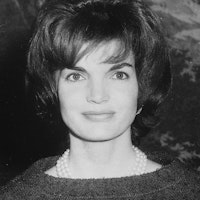If the situation develops, I will take Caroline and John, and we will walk hand in hand out onto the south grounds. We will stand there like brave soldiers, and face the fate of every other American.
Jacqueline Bouvier Kennedy

Every Other American
Topic: Justice, Vision, & Leadership
If the situation develops [a nuclear missile attack], I will take Caroline and John, and we will walk hand in hand out onto the south grounds. We will stand there like brave soldiers, and face the fate of every other American.
Jacqueline Bouvier Kennedy was born on July 28, 1929, in Southampton, New York, to John Vernou Bouvier III and Janet Lee Bouvier. Raised in a privileged yet turbulent household, she developed a love for literature, art, and equestrian sports. She studied at Vassar College before transferring to George Washington University, earning a degree in French literature in 1951. After graduation, she worked as a journalist for the Washington Times-Herald before meeting John F. Kennedy, then a U.S. senator. They married in 1953, and she soon took on the role of political partner, supporting his successful 1960 presidential campaign. At 31, she became First Lady, bringing attention to the arts, historic preservation, and diplomacy, notably overseeing the White House restoration and promoting American culture abroad.
As First Lady, Jacqueline Kennedy became an influential figure, admired for her intelligence, grace, and commitment to public service. Fluent in multiple languages, she played a key role in diplomatic visits, earning international admiration. She worked to preserve American heritage, establishing the White House Historical Association and advocating for historic landmarks. She also navigated moments of crisis, including the Cuban Missile Crisis. On November 22, 1963, she was at her husband’s side when he was assassinated in Dallas. In the aftermath, she orchestrated a funeral rich in historical symbolism and worked to shape John F. Kennedy’s legacy.
In 1968, Jacqueline Kennedy married Greek shipping magnate Aristotle Onassis, seeking privacy and security for herself and her children. After his death in 1975, she built a career as a book editor in New York City, working at Viking Press and later Doubleday. She remained engaged in historic preservation, playing a role in saving Grand Central Terminal. In her later years, she led a private life while continuing to support cultural and political causes. She died from cancer on May 19, 1994, at age 64, and was buried at Arlington National Cemetery alongside President Kennedy. She remains one of the most recognizable First Ladies, remembered for her contributions to American culture and history.
Kennedy, Jacqueline Bouvier. Brower, Kate Andersen. First Women: The Grace and Power of America’s Modern First Ladies. HarperCollins, 2016, p. 88.

Jacqueline Bouvier Kennedy
Theme: A Vision of America

About This Jacqueline Bouvier Kennedy Quotation [Commentary]
Jacqueline Bouvier Kennedy’s quiet declaration—“we will walk hand in hand out onto the south grounds. We will stand there like brave soldiers, and face the fate of every other American”—reveals a clear moral stance in a time of crisis. Faced with the possibility of nuclear attack, she rejected the offer to shelter in safety apart from the public. Speaking directly to her Secret Service agent, she began firmly, “Let me tell you what you can expect.” In doing so, she made it clear that her place, and her children’s, would not be one of exemption. She had already made up her mind: if danger came, they would meet it together, as others would. Her words reflect not only personal courage, but a refusal to separate private safety from public consequence.
The full passage clarifies the depth of her decision. “If the situation develops, I will take Caroline and John,” she said, choosing language that centers her children while remaining steady in tone. By saying “we will walk hand in hand,” she framed the act not as political symbolism but as a human response rooted in closeness and clarity. To stand “like brave soldiers” was not about warfare—it was about not turning away. It was about accepting that leadership also meant sharing risk. Her calm response, given in a whisper, carried its weight through restraint: she would not be told what to do, and she would not seek a different fate than the one facing other families.
In choosing to “face the fate of every other American,” Jacqueline Bouvier Kennedy gave voice to a vision of America grounded in shared consequence. Her words resist privilege and elevate dignity. Even in crisis, she held to the belief that leadership should not distance itself from the people it serves. Her decision was not rhetorical; it was direct and personal. As a mother, a public figure, and an American, she responded to fear not with retreat, but with presence. The strength of her statement lies in its clarity—and in the integrity of its follow-through.
Profiles In Courage, The Cuban Missile Crisis
During a private meeting with her Secret Service agent, Clint Hill, Hill reached out to Jackie and gently touched her elbow. “You know about the bomb shelter here, under the White House. I know that [Chief Usher] J. B. West gave you a brief tour of the facility a few months ago. In the event a situation develops… where we don’t have time to leave the area, we would take you and the children into the shelter for protection.” But Jackie had already made up her mind and she would not be told what to do. She abruptly pulled her arm away.
Hill was stunned. “Well, Mrs. Kennedy, let’s just pray to God that we will never be in that situation.”
—Brower, Kate Andersen. First Women: The Grace and Power of America’s Modern First Ladies. HarperCollins, 2016, p. 88.
Additional Jacqueline Bouvier Kennedy Quotations
Resources
Related Quotes
Copyright © 2017 – 2026 LuminaryQuotes.com About Us